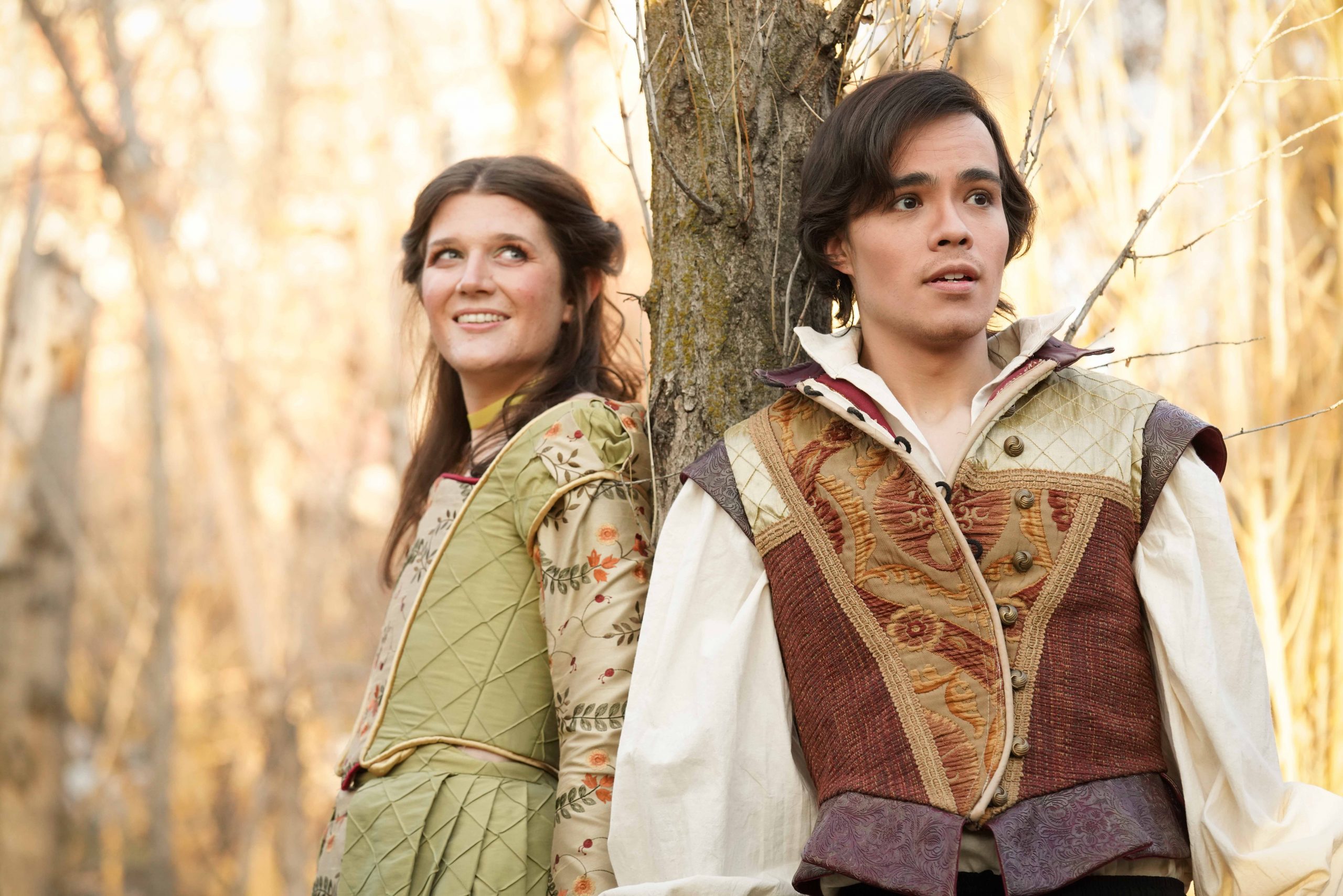SALT LAKE CITY — “Who ever loved that loved not at first sight?” Shakespeare asks in his play As You Like It. Left and right, the characters in As You Like It fall in love instantly. That does not make their relationships easy, though. Each couple has barriers to overcome before they can all get married in the final scene. Westminster College has mounted this classic play, and like its characters, the show has hurdles to overcome. But it bids its audience farewell after giving them a pleasant taste of a traditionally staged Shakespeare play.

As You Like It is one Shakespeare’s most popular comedies. However, it is also one of the most difficult to stage successfully. In previous reviews I have mentioned that the script provides no justification for why Rosalind remains in disguise after she meets with Orlando in the Forest of Arden, the inferiority of the script’s usage of Shakespeare tropes compared to the Bard’s other work, the difficulty of building a convincing relationship between Orlando and Rosalind when the latter spends almost all their stage time together in disguise, and how stupid Orlando seems to be for not recognizing his beloved Rosalind in disguise. These flaws are all still there, though Utah audiences seem to be very forgiving; in UTBA’s archives, it is the 4th most reviewed Shakespeare play (after Romeo and Juliet, A Midsummer Night’s Dream, and Macbeth).
Of those flaws, the Westminster production was most successful in making Rosalind’s disguise convincing enough for Orlando to not recognize Rosalind. Kate Slick‘s portrayal of Rosalind in disguise as the youth “Ganymede” is the most believable I have seen in a long time. She shines best in dealing with male characters as Rosalind’s equal in the Forest of Arden.

However, Slick’s performance lacks variety, and she used the same narrow range of voice and facial expressions in nearly every scene. Whether she was angry at Phoebe (played by Sara Peel), reading a letter, or flirting with Orlando, Slick’s acting was strikingly similar. This made the Orlando-Rosalind relationship suffer greatly because Slick did not show any special interest towards Jaden Richards as Orlando.
Richards, though, was a stronger performer, and he made Orlando a decisive and dynamic — a welcome change from the mopey Orlandos that often grace the Utah stage. I appreciated how Richards’s Orlando showed vigor in his opening scene where he gets into a brawl with his older brother, Oliver (played by Alec Kalled). Richards also shows a tender side to Orlando, especially when he invites Adam (played by Varlo Davenport) to travel with him into exile or when Orlando receives a lesson on how to court Rosalind from “Ganymede.”

Also noteworthy was the performance from Maddie Elledge as Celia. Elledge gives Celia a stability that serves as a source of emotional strength and reassurance for Rosalind. Moreover, the romance between Celia and Oliver was the most realistic of the four couples’ on stage, mostly because of the chemistry and mutual interest between Elledge and Kalled. It helps that Kalled is a charismatic actor; I hope to see him in a larger Shakespearean role in the future.
Like the leads, the quality of the performances from the supporting cast was mixed. Sophia Van Nederveen’s energy and grace brightened every scene she appeared in, though her lines solely functioned to move the plot along. Jeff Nichols was enjoyable as the shepherd Corin because he embodied the serenity of the countryside better than any of the other characters in the Forest of Arden. Emma Gilmore was a vicious Duke Fredericka; her rage and domineering presence were faithful to the script and gave me a hint of what Queen Elizabeth I may have been like when enraged. Gilmore’s Amienes, though, was a bland presence in the Forest of Arden. Indeed, the actors playing most of the denizens of the Forest of Arden struggled in their roles. Kat Smith’s performance as Jacques lacked the character’s bitterness, and I was confused why the character was supposed to be “melancholy,” given Smith’s nonchalant, staid portrayal. As Silvius, Jacob Harrison delivered his lines in an awkward and overexaggerated fashion that was out of place with the other actors’ performances.

Another uneven aspect of this production was Jared Larkin‘s direction. Larkin’s staging frequently made it difficult for actors to feed off of one another’s performances. Often actors were too far apart on stage, failed to make eye contact, or had unmotivated blocking and movement — all of which prevented organic scenes and interrelationships from developing. Additionally, the rules of the world of the play were sometimes unclear. When actors started expecting the audience to give a response, or when Silvius could hear Phoebe’s soliloquy describing him, it was surprising and distracting because before these moments, the fourth wall was firmly established and soliloquies were the characters’ private thoughts. On the other hand, I enjoyed Larkin’s stage pictures during the wrestling match and the marriage scene. Larkin also helped his actors vary the speed of their language, which was a useful tool for bringing comedy to the show, or slowing down and allowing moments to linger during the love scenes.
The best aspect of As You Like It was the detailed Renaissance costumes designed by Bette Shouse. The color-coordinated doublets on the men, the layered dresses for the women, the laced up sleeves and bodices, the realistic cloaks, and other pieces were exquisitely detailed. The costumes were instrumental for immersing the actors and audience into the turn of the 17th century.
Another strong technical aspect was the set, designed by Cara Pomeroy-Allen, which consisted of two sets of trees and some wall components. The wall pieces and ficus trees were used to represent the court of Duke Fredericka and gave a stately feel to the setting. (The way the wall pieces came together to form a gate was the best scene change I have seen in a while.) The trees for the forest were flexible in their placement and could accommodate Orlando’s love sonnets and the other demands of the script. Yet, the choice to remove and add leaves to the trees was unhelpful because it implied that weeks or months passed between scenes — and about nine months passed in the entire span of the play — which did not seem plausible when characters acted like earlier scenes were fresh in their minds. (Phoebe and Silvius apparently argued about the same topic for six months.) To be fair, Shakespeare was vague about how long Orlando and Rosalind are in the Forest of Arden, and so showing weeks or months passing between scenes is not a crazy idea.
All in all, there are just enough strengths in this production of As You Like It to make it worth audience members’ time. The play still has its problems, but that has not stopped it from being performed for 400 years. Westminster College’s As You Like It provides audiences with a pleasant evening that can even make a cynic like me (or Jacques) believe in love at first sight.
[box]As You Like It plays Thursdays, Fridays, and Saturdays at 7:30 PM and Saturdays and Sundays at 2 PM through April 10 in the Jay W. Lees Courage Theatre on the campus of Westminster College. Streaming performances are offered on April 8 and 9 at 7:30 PM and April 10 at 2 PM. Tickets are $15 (or free for K-12 students; streaming performances are also free for the Westminster College community). For more information, visit https://westminstercollege.edu/student-life/events-and-performances/performing-arts-events/performing-arts-tickets.html.[/box]

